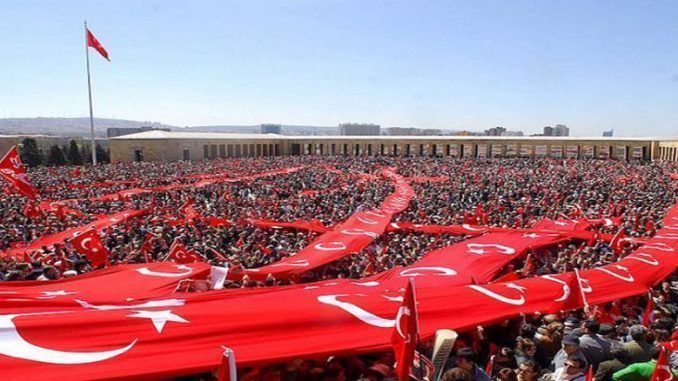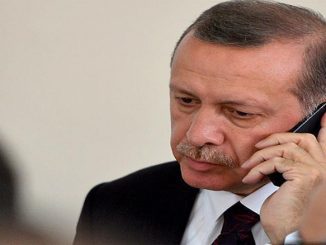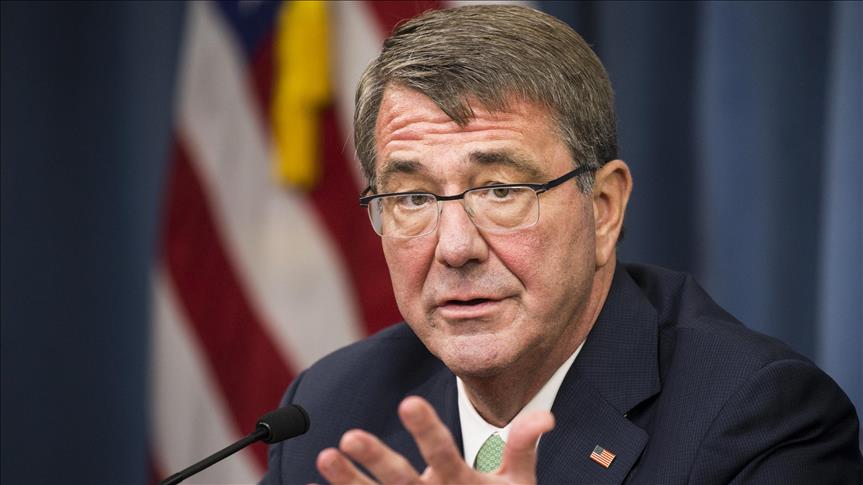
 By: Nebi Miş*
By: Nebi Miş*
A debate on changing the political system and adopting a new one in a country is all about political crisis that a country has been facing with for a while. In other words, a country does not resort to change its political system unless the system entails problems. An intense debate starts in a country in order to overcome the problem of its governmental system that is unable to ensure political stability and that also restrains the development of democracy. By this, the development process is shaped as a result of the political sociology and historical knowledge of the country. A country which is failed to get any outcomes of the changes, done within its current system in order to overcome problems of the existing governmental system it has been experiencing for a long period, brings the option of system change into question.
In Turkey, the need for a new political system has become urgent upon the crisis faced during coalition periods and ineffective governments existing within the parliamentary system. The past coalitions formed by at least two different parties have largely interrupted the functioning of Turkish democracy. This is also the consequence of party fragmentation and political instability created by conflicts between different identity groups. In such a period of instability, politics as an apparatus has been weakened and become helpless. Thus, this led military interventions to be conducted easily and as a result democracy had been suspended for many times.
The argument of the transformation of parliamentarism into presidentialism in Turkey has been addressed in sufficient time. The history of this argument can be traced back to the1970s. The National Salvation Party (MSP) and the National Order Party (MNP) first initiated the need for a change in the government system and supported a change by favoring the presidential system. The Nationalist Movement Party (MHP) supported presidentialism in that period as well. The main motive behind those system-change-suggestions proposed by the political parties is to prevent unstable coalitions and government crisis. In this sense, one has to take into consideration that eleven different governments were formed between the years 1972 and 1980.
During the constitution making process subsequent to the 1980 military intervention, both presidentialism and semi-presidentialism have been kept on the agenda at the same time and they have been argued upon a model of a president to be elected by citizens. Actually, this new argument was not a surprise but convincing as in the period before the intervention had been problematic due to the parliamentary deadlock encountered as a result of the presidential elections which had to be repeated for 124 times in the parliament. However, these debates had been suppressed by the military junta – the supporter of a presidency acting as a guardian to protect tutelage mechanism, which also fits with the ideology of the junta.
President Turgut Özal reinitialized the system change arguments as in favor of presidentialism in 1988. Özal promoted presidentialism as “a dynamic for the change” and the optimum model for Turkey while he discredited the Turkish model of parliamentarism as it slowed down the initiation of necessary reforms. Also, he emphasized the failure of coalitions for the lack of effective governance. On the other hand, Özal pointed out another important point of presidentialism. The presidentialism would serve Turkey’s integrity in which social diversity and political culture shaped by nepotism and clientelism triggered political fragmentation.
Although Süleyman Demirel criticized the arguments of Turgut Özal by claiming that Özal would have desired a one man rule, Demirel supported a system change toward presidentialism in 1997, when he was president. The starting point of Demirel’s presidentialism debate was his saying that “I have been president for four years and three months and have already approved six different governments”. The main argument of both Özal and Demirel is based on “political stability”, “governability”, “consolidation of democracy” and similar reasons.
Debate After the System Crisis
Recep Tayyip Erdoğan has supported the presidential system since his mayorship of İstanbul and he is one of the leaders who support it for a long time in Turkish political life. In the era of AK Party, further discussions in context of a presidential government system have begun in 2005 and intensified in 2007, with the outbreak of “367 crisis” in the parliament. During that time AK Party’s presidential candidate Abdullah Gül was prevented to be elected as president despite all precedents. Thus, the debate concerning the Turkish political system was brought into a different stage. After the “367 crisis”, the parliamentary system has been transformed into a deadlock, whereupon the AK Party and Motherland Party (ANAP) made a deal of conducting a referendum for the election of the presidents by popular vote. By this, future problems should be prevented. After having accepted the constitutional amendment in a referendum in 2007, and ultimately in August 2014, the first president was elected by popular vote. By this, it can be said that the Turkish government system has been transformed -de facto- into a semi-presidential one. Subsequent to the election of the president by popular vote, the framework for a government system change has been established due to problems such as based on the “dual executive” and “confusion of authority”.
In the era of AK Party and Tayyip Erdoğan, presidentialism have been discussed and supported within the following framework. Thus, presidentialism was supported:
A) To establish a system with the main objective to prevent Turkey from falling into political instability; which has been faced several times in the past. B) To cease coalition governments which are very related with parliamentary system and its chaotic era, which creates crisis, a fragile political life, party fragmentation, interruption of both democratization process and economic growth in the country. C) To abolish uncertainties which has taken its roots within the political culture and become a beneficial tool for civil/bureaucratic tutelage D) To deliver a solution for the “dual executive” problem. E) To strengthen the legitimacy of executive power by the virtue of direct, popular elections. F) To create a fertile environment to develop and institutionalize democracy by perpetuating the people’s will.
Arguments Against System Change
In Turkey, discussions concerning the transformation of the current government system into a presidential one were generally debated through political figures. Elite groups holding strategic positions had negative standpoints toward the issue because of the reason that the supporters of presidential system are representatives of the periphery. When the issue has become the main topic of political arena at the first place, discussions in politics and academia were conducted by the main figures so that the issue has become “personalized”. In the eras of Süleyman Demirel, Turgut Özal and also Recep Tayyip Erdoğan, opponents had addressed the system change issue over the personalities of these three leaders by claiming that the transformation into presidentialism in Turkey would have led to a “one man rule”. In addition, this argument was also supported with a discourse of authoritarianism which based on the presidentialism supporters’ personality.
On the other hand, opponents were not able to suggest any solution to crisis created by the parliamentary system. In addition, the discussion about presidentialism has been maintained over political concerns. The reason for this choice based on the fact that a potential presidential system proposal will most likely be approved in a possible referendum. One of these political concerns is the claim that subsequent to the adoption of presidentialism Turkey will also adopt federalism, as it is the case in the US presidential system. This argument aims to create a fearful atmosphere in society referring to “the Kurdish issue” and the actual threat of separatism. Another argument is the bias of reducing the system change debate into a “regime shift”, which is generally addressed by Kemalist elites and parties by aiming to spread the fear of ending the Republican regime.
However, AK Party governments and President Recep Tayyip Erdoğan always draw attention to a threat of political crisis in the current parliamentary system because the system enables the political existence of both a strong and elected president and prime minister. For now, both figures have the same ideological background / political movement and they can overcome problems by negotiation. But in the future, Turkish president and the prime minister could have different ideologies and political agendas, which thus can quite possibly cause a new deadlock in the parliamentary system.
The AK Party-MHP Consensus
The ongoing discussions of presidentialism led by President Erdoğan and the AK Party have turned into another direction subsequent to the 15 July Coup Attempt. The reason for that based on the the Nationalist Movement Party’s (MHP) new standpoint with regard to the presidential system. While previous to the coup attempt the MHP had an opposing attitude towards a presidential transformation, this has been reversed after the coup attempt. By this, the debate on the system change has been restarted. According to the MHP’s view, the 15 July Coup Attempt was an attempt to divide Turkey. Each political party should take responsibility for the sake of the country. MHP chairperson, Devlet Bahçeli, stated that the existing government system was not defined in the constitution and thus the current de-facto government system has to be regulated in the constitution. This statement means that the AK Party should urgently submit its proposal to the parliament and then, the political system should be determined in the referendum. Bahçeli also indicated that opposing the change in the political system would be nonsense in case of its acceptance in the referendum.
After this process, the AK Party proposed the constitutional amendment to an inter-party parliamentary commission established by the AK Party and MHP. The main opposition party in the parliament, the Republican People’s Party (CHP), announced that they would not open a new constitutional amendment up for discussion. However, Kılıçdaroğlu previously
said he could accept switching from the parliamentary system to an American-type presidential system.
The AK Party and MHP announced the draft for the constitutional amendment including a switch to presidential system to the public in a joint press meeting on December 10. The context of the draft prescribed the shift to an executive presidential system. This draft only regulates the articles of the constitution related to the government system. The new system is based on a unitary system of the country and proposes keeping up a one-chamber parliament. The elections of the president and parliament will be run every five years concurrently in public elections. The president can be elected to the presidency no more than twice successively. In the draft, there are also new constitutional articles concerning, for instance, the vice-presidency and the substitute membership (of the parlimanet). In addition, there is not any regulation that forbids the elected president’s relations or membership with his/her political party. On the other hand, the president is the head of the executive branch. The ministers in the cabinet must not be members of parliament and the president will be authorized to dissolve the parliament in case of political gridlock. If the president dissolves the parliament, it will also mean the dissolution of his presidency.
There is a lot of undue criticism about the new system such as the claim that the new system will cause a one-man rule. However, the president has to get at least half of the votes to be elected. The false assumption about ease of getting half of the votes arises from Erdoğan’s election successes. However, reaching this ratio is difficult to someone not fulfilling the expectations of the public and not providing political stability and social welfare. Thus, the presidential candidates will need support of other parties during their campaigns.
Additionally, the length of a presidential term is fixed in presidential systems. The president can serve only two terms according to the proposed constitutional amendment restricting long-term remaining in office. In AK Party’s constitutional proposal, while the checks and balances mechanism is formulated, the emphasis on political stability comes into prominence. The reason for this preference is based on the fact that a military coup d’état was quite possible in the aftermath of political instability shaped by coalition governments. Thus, in the formation of the balance between legislative and executive branches, people’s role of monitoring via elections will be one of the key components of the system.
*Nebi Miş is SETA Political Research Director. He wrote this article exclusively to Middle East Observer on Wednesday, Dec. 27, 2016.



